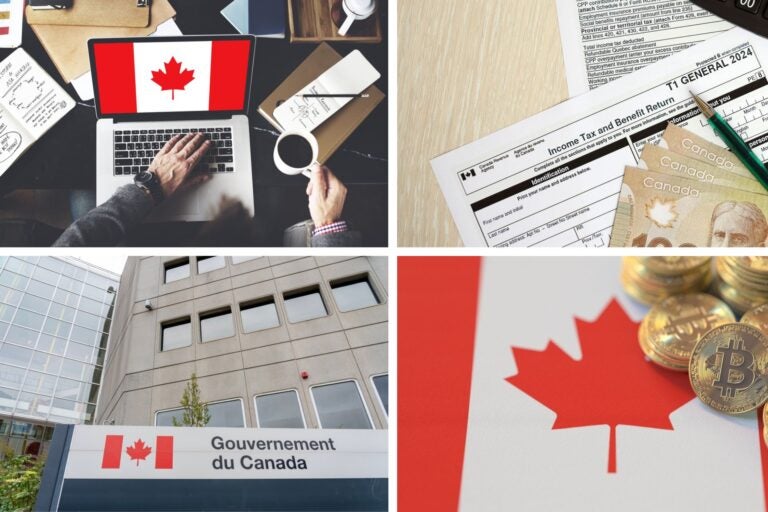Taxes in Canada for digital nomads: All you need to know
Are you a digital nomad in Canada? Make sure you understand the taxes in Canada you might be responsible for. We’ve got all the details.
If you’re thinking about living in Canada while working remotely, it’s important to understand how taxes in Canada apply to digital nomads. Knowing your tax responsibilities will help ensure a smooth and legal stay, giving you peace of mind that you’re complying with Canada’s tax system.
Canada is a safe country with a high quality of life and strong technological infrastructure, which is why it’s becoming an increasingly popular destination for digital nomads.
In this blog, we’ll dive deeper into how to file taxes in Canada for remote workers, covering the laws that apply, tax rates, important deadlines, and the benefits you might qualify for. Grab your calculator and stay tuned!
How do taxes work for a digital nomad in Canada?
A digital nomad is someone who works remotely from anywhere in the world but is required to pay taxes in the country where they are considered a tax resident.
In Canada, your tax residency isn’t determined by the type of visa you hold, but rather by your personal and economic ties to the country and how long you stay there.
So, a digital nomad in Canada is required to declare taxes once they rent a place, open a bank account, and stay for an extended period. At that point, they’ll need to pay taxes on their worldwide income (even if it comes from foreign companies).
What law regulates taxes for a digital nomad in Canada?
The main law governing taxes for digital nomads in Canada is the Income Tax Act, which outlines who must file taxes, under what conditions, and at what rates.
On the other hand, the Canada Revenue Agency (CRA) is responsible for enforcing and overseeing this law. According to the Income Tax Act, it’s important to distinguish between:
- Tax resident: A citizen who is taxed on all of his global income.
- Non-tax resident: You only have to declare income from Canadian companies.
When should I start paying taxes in Canada?
Canada doesn’t have a dedicated digital nomad visa, but there are other ways to legally work remotely here. Options include the Working Holiday program or International Experience Canada. That said, when do digital nomads actually need to start paying taxes in Canada?
- If you stay in the country for more than 183 days in a tax year.
- If you establish significant ties such as renting a home, opening a bank account or having a stable relationship with a Canadian person.
- If you generate income through economic activities carried out within Canada.
Is this the case for you? Then you will have to register with the Canada Revenue Agency and file your tax return annually.

Tax benefits for digital nomads in Canada
While the country doesn’t offer specific tax incentives for this group, there are various benefits you might qualify for depending on your situation. For example:
- If you’re not a tax resident and your clients are foreign, you won’t have to pay taxes in Canada.
- You can write off certain remote work expenses, such as coworking space fees, equipment purchases, or internet service costs.
- You may be eligible for a partial refund on indirect taxes like the GST/HST when you purchase goods or services needed for your work.
How much tax do I have to pay in Canada?
Taxes for digital nomads in Canada are governed by a two-tier system: federal and provincial. These are the main types of taxes you’ll encounter:
Income tax
This type of progressive tax applies at both the federal and provincial levels and is based on your income. The federal rates work like this:
- 15% rate: For income up to $41,885
- 20.5% rate: From $41,885 up to $83,760
- 26% rate: From $83,760 up to $129,855
- 29% rate: From $129,855 to $185,993
- 33% rate: From $185,993 and above
On top of the federal taxes, each province has its own tax rates. For example, in Ontario, rates range from 5.05% to 13.16%, while in Quebec, they fall between 15% and 25.75%.
Pension plan contributions
Self-employed workers, including digital nomads, are required to contribute 11.9% of their net income to the Canada Pension Plan (CPP), up to a set maximum.
GST/HST (value added tax)
GST (Goods and Services Tax) and HST (Harmonized Sales Tax) are taxes in Canada that digital nomads must charge when selling goods or services. The rates are as follows:
- GST: 5% federal tax that applies across the country.
- HST: Combination of GST + provincial tax. It applies in some provinces that have unified both taxes.
If you’re a digital nomad offering digital services or selling products like online courses or software, and your annual income exceeds $21,900, you’ll need to charge these taxes to your clients.

Double taxation and agreements with Canada
To prevent digital nomads from being taxed both in Canada and their home country, the Canadian government has signed double taxation agreements with over 90 countries.
These agreements are especially important for digital nomads who are considered tax residents in Canada, as they help prevent double taxation by offering tax credits. Some of the countries covered by these treaties include:
- Spain, Mexico, United States, Argentina, Colombia, Chile, Germany, France, United Kingdom and Italy.
Where can I get advice before paying taxes as a digital nomad in Canada?
If you need professional guidance on taxes in Canada as a digital nomad, there are specialized advisors who can help ensure you meet your tax obligations in the country.
You can hire these local and foreign companies online, even if you are not yet residing in the country. Here are the most important ones:
- Trowbridge Professional Corporation: They specialize in international taxation and offer advice for nomads and freelancers.
- Cadesky Tax: Canadian company with experience in taxation for digital nomads. They advise you on the processing of taxes online.
- Benson Buffett Tax & Accounting: This service offers tailored packages for digital entrepreneurs and freelancers. Their platform provides tools to help you track income, expenses, and deductions.
- Wealthsimple Tax: It’s an online platform that lets you file your own tax return. We recommend it for nomads with straightforward income who understand their tax obligations.
How to connect to the Internet as a digital nomad in Canada
For digital nomads, having a dependable internet connection is essential. It should be strong and secure, allowing you to work seamlessly from anywhere in Canada, whether that is a coffee shop, a coworking space, or right in the middle of nature.
Holafly Plans now offers options designed to keep you connected while working remotely in Canada. You can pick from different subscriptions, including an unlimited data plan with 5G and the ability to connect two devices at the same time (all for $64.90 a month).
Important: If you are a frequent traveler and want to stay connected without worrying about expensive roaming or looking for a new SIM at every destination, Holafly’s subscription plans are for you. With a single eSIM, enjoy internet in more than 170 countries for a fixed price and no surprises on your bill. Travel without limits and connect easily and securely! 🚀🌍

Frequently asked questions about taxes for digital nomads in Canada
Yes, if you’re considered a tax resident in Canada, you’ll need to report all your worldwide income. However, you can also take advantage of double taxation agreements.
Yes, you’re able to deduct some costs tied to your digital nomad work, such as internet, a portion of your accommodation, equipment, software, coworking spaces, and local travel. Just be sure all expenses are clearly linked to your business and properly documented.
Failing to file your annual tax return in Canada could lead to fines or interest charges. It might also impact your chances when applying for a visa in the country.
Once your annual income reaches around $10,950, you may be required to file taxes. To register for GST/HST, the threshold is $21,900.
Canada’s fiscal year runs from January 1 to December 31, and personal tax returns are due by April 30 of the following year. For freelancers and digital nomads, the deadline can be extended to June 15.
If you don’t have a SIN because of your immigration status, you can apply for an ITN (Individual Tax Number) through the Canada Revenue Agency to meet your tax obligations as a non-resident.





 Language
Language 


















 No results found
No results found








